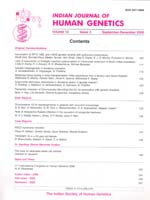
|
Indian Journal of Human Genetics
Medknow Publications on behalf of Indian Society of Human Genetics
ISSN: 0971-6866
EISSN: 0971-6866
Vol. 9, No. 1, 2003, pp. 25-28
|
 Bioline Code: hg03007
Bioline Code: hg03007
Full paper language: English
Document type: Research Article
Document available free of charge
|
|
|
Indian Journal of Human Genetics, Vol. 9, No. 1, 2003, pp. 25-28
| en |
Pairwise MtDNA-HVRII sequence differences and geographic maternal distances among Korku, an Austro-Asiatic tribe in Central India
Raghavendra V. Rao, Kumarasamy Thangaraj, Alla G. Reddy, V. Sridhar, Lalji Singh
Abstract
Ethno-linguistic and recent molecular evidences were equivocal that tribes belonging to Austro-Asiatic linguistic group were the earliest 'out of Africa' migrants in the Indian sub-continent dating back to approximately 60,000 YBP. They comprise of few endogamous groups and were settled in eastern and central India. In the present study it is found among Korku, an endogamous Austro-Asiatic tribe settled in central India, that oldest females pairwise, maternal geographical distances were inversely related with mtDNA-HVRll control region sequence differences, mismatch distribution was unimodal and the most common haplotype had wide geographical distribution. The empirical findings lead to 1) the possibility of an explanation that the Korku, though showed demographic expansion, the place of expansion may not be the area of their present habitation 2) the scope of combining information on maternal distances and mtDNA sequence diversity in deriving demographic history of populations.
Keywords
MtDNA-HVRII, Maternal distances, Austro-Asiatic tribes, India.
|
| |
© Copyright 2003 - The Indian Society of Human Genetics
Alternative site location: http://www.ijhg.com/
|
|
